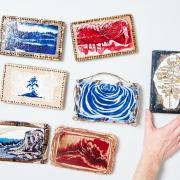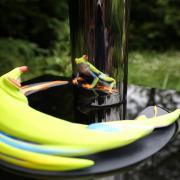With its two coasts and access to lucrative shipping channels, Devon was an ideal base for smugglers, writes Robert Hesketh
Smuggling became a huge and highly profitable industry in Britain’s maritime counties between 1700 and 1850, as the government repeatedly raised customs and excise tariffs, its main resource for war and imperial expansion. Most working people were on subsistence wages and ‘Free Trade’ promised good money, adventure and access to exorbitantly taxed luxuries like brandy, silks, tobacco and tea. With a host of skilled seamen and boat builders, plus two long coastlines thick with secluded beaches and coves, Devon was ideal for smuggling. The south coast enjoyed easy communications with the Channel Islands and France, major sources of supply, whilst the north coast was on the shipping lane to Bristol, importing centre for tobacco and rum.
Smugglers enjoyed the backing of virtually the whole community – anyone who dared betray them was in real danger. Few Devonians thought smuggling immoral and it was notoriously difficult to convict smugglers with sympathetic local juries. Discreet finance came from well-heeled pillars of society, who also proved good customers.
Born and bred to the sea, Devon’s smugglers knew their coastal waters far better than the preventives. And so, these clever underdogs usually outmanoeuvred the dull-witted authorities. It’s an appealing, almost romantic picture and even partly true, but smugglers inevitably resorted to violence in challenging armed state authority.
Paignton Sands witnessed one such conflict in 1783 when Swift, carrying 16 guns and 50 smugglers fought a running battle with two Revenue cutters. Backed by a Brixham sloop, the smugglers had the best of the fight, which involved gunfire and serious injuries. They landed 9,000 gallons of spirits and four tons of tea and might well have destroyed the Revenue cutters too, but for support from Berry Head Battery.
Smugglers also used intimidation. The Plymouth tide surveyor was murdered ‘about the running of brandy’ in 1732. Two excisemen met the same fate at Roncombe Gate between Beer and Honiton in 1787. High cliffs were a particular hazard: in 1775 Henry Mugford, the waiter and searcher at Brixham ‘fell over a cliff’ and was drowned. Ten years later, Richard Cullen met a similar death. In Branscombe churchyard, ‘Lieth the Body of Mr. John Hurley, Custom House Officer... As He was endeavouring to extinguish some Fire made between Beer and Seaton as a Signal to a Smuggling Boat He fell by some means or other from the Top of the Cliff… 1755.’

Beer was home to Devon’s best known smuggler, Jack Rattenbury, and almost everyone in the close-knit fishing community was involved. White Cliff, Beer Head and Beer’s church tower were favoured signalling stations, whilst Hooken Undercliff and Beer Quarry Caves provided ideal hiding places from where contraband was later distributed by teams of packhorses across a network of secret cross-country trails.
Smugglers frequently switched landing places to avoid detection. Further west, Dawlish Warren was sometimes favoured; Brandy Cove, Smuggler’s Hole and Smuggler’s Cove testify their story, whilst the South Hams offered many more discreet beaches and coves.
Free Traders preferred dark winter nights, when the Navy and preventives were most likely to stay in port. It was dangerous, but the rewards high. Shipwrecked by Bolt Head, Philip Kingcup was lost with all his crew. Their vessel was washed ashore at Hope Cove with Kingcup’s brandy kegs still slung around her gunwales.
All who took to sea in the age of sail risked their lives, as a memorial at Seaton Church to Midshipman Paulson of HMS Queen Charlotte and eight seamen testifies. They ‘perished in a gale of wind off Sidmouth whilst crossing in a galley for the prevention of smuggling, 1817’.
Devon’s north coast was also notorious, especially Lundy, a fortified haven. Most contraband was landed safely, but the authorities made much of their modest successes, refuting well-founded accusations of collusion. Twenty barrels of spirits and 13 bales of tobacco were seized at Heddon’s Mouth in 1786. Revenue cutter Scorpion captured 50 barrels of brandy, 150lbs of tobacco and four bags of tea at Northam Burrows in 1782, whilst the tidewaiter found 210 casks of spirits and a cache of tobacco at Instow.
With France finally defeated in 1815, the Navy cracked down on smuggling. However, even with the aid of the Coastguard from 1822, smuggling continued to thrive until the 1840s, when Peel’s government reduced or abolished tariffs that had made smuggling so profitable for so long.
Smuggling inns
Many Devon inns claim a smuggling connection. Combe Cellars on the Teign Estuary was an ideal smuggling depot, where vessels could be unloaded directly. Smugglers reputedly hid their contraband in a secret room at the Journey’s End, Ringmore near Kingston, whilst the Pilchard on Burgh Island is haunted by smuggler Tom Crocker, who was shot there by the Excise.
The resurrection of Bob Elliott
Most evidence for smuggling comes from official sources. Naturally, smugglers kept quiet about their work – but enjoyed a good tale, like that of Brixham fisherman Bob Elliott. When the Coastguard heard he had contraband stashed in his cottage, Bob let it be known he was laid up with gout (an occupational hazard for bibulous smugglers). When they arrived at Bob’s door, his tearful wife told them he had just died. The disconcerted Coastguards respectfully forbore to search the property. Some even joined Bob on his final journey, remarking Bob’s coffin was unusually large… but then he was an exceptionally large man. Turning sadly to greet fellow mourners, they were terrified to see Bob himself among them and fled in terror. A sceptic, their commander angrily dismissed their tale and stormed off to confront Bob in his lair, but retreated in shame as he heard the man himself boasting how he had duped the Preventives, hiding his contraband in his own casket.
Devon Smugglers, the Truth Behind the Fiction, by Robert Hesketh, Bossiney Books, Launceston, 2007
roberthesketh.co.uk







































